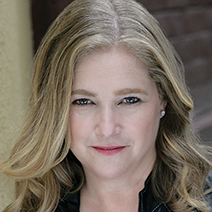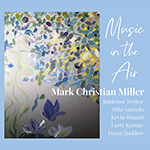Wendy Scherl
New Scherl in Town
Metropolitan Room, NYC, May 23, 2017
Reviewed by Rob Lester for Cabaret Scenes

Was hearing Wendy Scherl, a guest in Robin Westle’s classy Robin’s Nest variety show series, presenting two selections from her New Scherl in Town act enough to make me eager to see that whole thing? It “Scherl”-y was!! In fact, she captivated me so quickly that my decision was made before the middle of the first song. Similarly, with her knockout opening number at the Metropolitan Room, Irving Berlin’s “I Got the Sun in the Morning,” this wonderfully winsome Wendy wowed her audience right away, judging by the cheers and palpable sense of excitement. The vibrancy of her voice and punch of personality filled the air, and she had an air of confidence. This wisely-chosen piece’s first impression established the unfussy, down-to-earth performer as a grateful woman with things in perspective. A hip and fresh arrangement, with modulation and some powerhouse sustained notes, added to the magnetism and sense that we were in good hands. Second order of business: In song, “I’m Old Fashioned” let us know exactly that, and her patter after it elaborated on her status as a housewife of many years, suburban, station-wagon owner, mom. (Her kids have grown up and moved out, and she only recently returned to performing.)
A life-long love for musical theater (and college major and early career) became evident in some material choices, but we got an eclectic mix, including a feisty “Love Sick,” a Broadway blast of recent vintage (2010’s Women on the Verge of a Nervous Breakdown; words and music by David Yazbek). Jerry Herman’s cathartic burst of pent-up rage, “Wherever He Ain’t” from Mack & Mabel, had a refreshingly original arrangement, starting at a slower, lower boil with just bass accompaniment (the fine, fine Bob Renino). On the other hand, “Anyone Can Whistle” shines brightly without new-fangled bells and whistles or changing the temperature of the tempo; a very spare and traditional approach to this wistful Stephen Sondheim gem about how difficult it is to “let go” rings true. This selection (the final one) has Christopher Denny’s tenderly supportive piano as sole (and soulfully sweet) accompaniment.
Happily caught in the whirl and swirl of Scherl, the warmth and wonder with which she crooned Bob Dylan’s “Make You Feel My Love” could make you feel it could pass as a cozy, reassuring Disney princess lullaby, albeit minus the sugar coating. The voice is appealing and caresses melodies, with a vibrato and vulnerability when appropriate, but a strength and brightness that come into play when playful. The blithely bouncy “There Are Two Sides to Everything” (from the 1966 television score for Alice Through the Looking Glass by Moose Charlap and Elsie Simmons) is an inspired choice of a chipper but lesser-known item which works its endearing charms.
The patter could use some tweaking and tightening and better follow-through. A few moments of well-done humor are too few—and more is needed in the latter half. Perhaps a little-known comic number could do the trick and substitute for the oldie “Makin’ Whoopee” (although maybe I am in the minority as one who knows the words by heart, so it takes more sass or “attitude” to spice them up; I did appreciate the little lyric adjustment to add texting as one more thing the wandering husband doesn’t do to be communicative while the wife “sits alone most every night.”) While Wendy Scherl gives us some commentary about her autobiography, mentioning adjusting to life and people who weren’t New Yorkers like herself (until the “warm and approachable thing” got old and she needed the angst and edge of NYC again), the narrative is dropped for too long and she fast-forwards to recent years of her marriage (a nuanced and fondly crooned “Sleepy Man”) and the “empty nest” without telling how or when she met her husband, or his predecessors (if any) in her pre-marriage romantic life, despite having sung several songs about love. When she does get personal and honest, it can be quite effective. For example, she reveals that the venue’s MetroStar Talent Challenge of last summer, in which she was the First Runner-Up, had its ups and downs, and that she came very close to dropping out right before the final week and that her husband talked her out of it. And the singer freely admits that she is still riding the learning curve, getting back in the game, expressing thanks to her ace supportive team of director Barry Kleinbort and Musical Director Mr. Denny, who pushed and challenged her (in the good ways) to be better and to try different things. There was gratitude, too, for bassman Renino, and the subtle, attentive, and versatile drummer Rex Benincasa. In talking about their rehearsal process and her return to singing, she might rethink using the overused word “journey.”
The stage is small, especially with a drum set and bass, so a stool that was only used to sit on for one ballad blocked what could have been used as valuable real estate to move a few steps while singing or talking instead of being stationary, standing in front of a standing microphone. Her gestures were mostly effective, outstretched arms reaching out to different points in the audience having the effect of addressing individuals with points made in lyrics, as if to say “Hasn’t this happened to you? Am I right?” However, later, this turned into pointing with one finger instead, which can read as lecturing. I point out the pointing because it should be used judiciously. Very occasionally, gestures became cliché in their literalness—pointing to her heart on the word “heart,” pointing up and down and back and forth when the song’s words talk about directions to go in “Wherever He Ain’t.” These lapses are small quibbles and easily fixed.
A little more edge, rue or resignation would make “A New York Romance” (Rusty McGee) stronger. But “Don’t Blame Me” was marvelously nuanced and in the zone, free of any coyness, truly invested, as was William Finn’s potent “Anytime.” She was so committed in the latter, and the audience so involved in this dramatic piece, that even when she momentarily lost her place and had to be helped back on track by Denny, the mood was not broken as she recovered deftly and with grace, the strong impact not diminished, the masterfully cast spell not broken. This is the sign of a pro, a resourceful performer who already has the audience in her pocket and on her side.
Focused, likable and skillfully communicative, this is an artist well worth seeing now, although it’s an easy bet that each post-sabbatical year and show will show her to be stronger, more secure, more individual. This mama got her cabaret “sea legs” again at Don’t Tell Mama in a show called What Do You Do All Day? Prior to the MetroStar attention-grabber). Let’s hope that she won’t re-retire from singing any time soon. I keep thinking of the celebratory statement about her namesake celebrated in song in the musical Peter Pan: “Lovely Wendy’s here to stay!” She is lovely, in all senses of the word, and so is her show, and, assuming she’s “here to stay,” I am here to say I’ll be eager to catch her again and again. I heartily encourage all who appreciate a heartfelt classic cabaret to get to the last scheduled show of There’s a New Scherl in Town at the Metropolitan Room on June 15.




